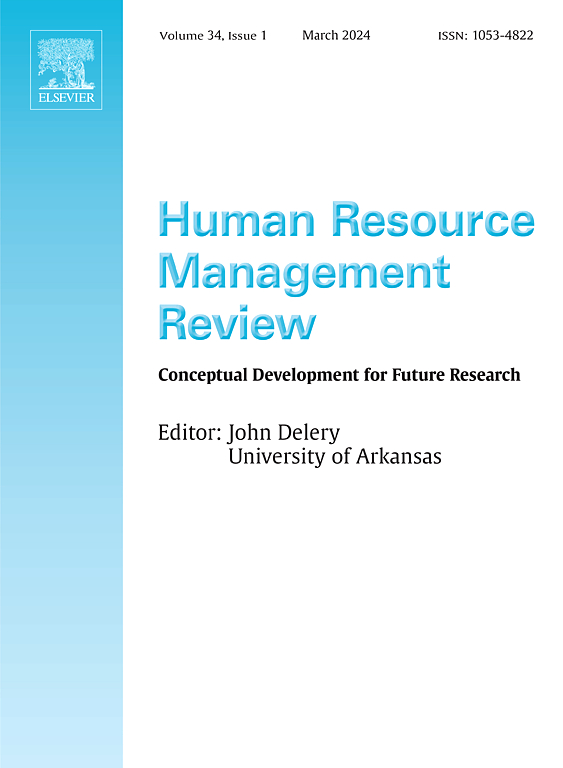The story beyond the stats: Decoding the psychological impact of human resource analytics on employees
IF 13
1区 管理学
Q1 MANAGEMENT
引用次数: 0
Abstract
Human Resource Analytics (HRA) has emerged as a significant trend with high-performing organizations using analytics for evidence-based decision-making. Although prior research demonstrates that HRA adoption could entail job resources and challenges for employees – particularly HR specialists and line managers- the field lacks a robust theoretical framework for a focused and systematic investigation. To address this gap, we conducted a mixed-methods review of 39 articles selected based on rigorous inclusion and exclusion criteria. Our study examines the psychological impact of HRA on employees, shedding light on the impact of the integration into daily work. Applying the Job Demands-Resources (JD-R) model, we offer a balanced perspective of employees' psychological responses to HRA, extending prior work on technology adoption. This framework enables us to map out the direct, mediating, and moderating relationships between key variables, providing a clearer understanding of HRA's implications for employee well-being and performance.
数据之外的故事:解读人力资源分析对员工的心理影响
人力资源分析(HRA)已成为高绩效组织使用分析进行循证决策的重要趋势。尽管先前的研究表明,采用人力资源管理可能会给员工带来工作资源和挑战,尤其是人力资源专家和直线经理,但该领域缺乏一个强有力的理论框架来进行集中和系统的调查。为了解决这一差距,我们根据严格的纳入和排除标准对39篇文章进行了混合方法综述。我们的研究考察了人力资源管理对员工的心理影响,揭示了融入日常工作的影响。运用工作需求-资源(Job requirements - resources, JD-R)模型,我们提供了一个平衡的视角来看待员工对人力资源管理的心理反应,扩展了之前关于技术采用的研究。这个框架使我们能够绘制出关键变量之间的直接、中介和调节关系,从而更清楚地了解人力资源管理对员工福利和绩效的影响。
本文章由计算机程序翻译,如有差异,请以英文原文为准。
求助全文
约1分钟内获得全文
求助全文
来源期刊

Human Resource Management Review
MANAGEMENT-
CiteScore
20.20
自引率
7.00%
发文量
0
审稿时长
48 days
期刊介绍:
The Human Resource Management Review (HRMR) is a quarterly academic journal dedicated to publishing scholarly conceptual and theoretical articles in the field of human resource management and related disciplines such as industrial/organizational psychology, human capital, labor relations, and organizational behavior. HRMR encourages manuscripts that address micro-, macro-, or multi-level phenomena concerning the function and processes of human resource management. The journal publishes articles that offer fresh insights to inspire future theory development and empirical research. Critical evaluations of existing concepts, theories, models, and frameworks are also encouraged, as well as quantitative meta-analytical reviews that contribute to conceptual and theoretical understanding.
Subject areas appropriate for HRMR include (but are not limited to) Strategic Human Resource Management, International Human Resource Management, the nature and role of the human resource function in organizations, any specific Human Resource function or activity (e.g., Job Analysis, Job Design, Workforce Planning, Recruitment, Selection and Placement, Performance and Talent Management, Reward Systems, Training, Development, Careers, Safety and Health, Diversity, Fairness, Discrimination, Employment Law, Employee Relations, Labor Relations, Workforce Metrics, HR Analytics, HRM and Technology, Social issues and HRM, Separation and Retention), topics that influence or are influenced by human resource management activities (e.g., Climate, Culture, Change, Leadership and Power, Groups and Teams, Employee Attitudes and Behavior, Individual, team, and/or Organizational Performance), and HRM Research Methods.
 求助内容:
求助内容: 应助结果提醒方式:
应助结果提醒方式:


